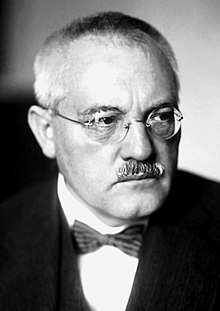Our website is made possible by displaying online advertisements to our visitors.
Please consider supporting us by disabling your ad blocker.
Carl Bosch
Carl Bosch | |
|---|---|
 Bosch c. 1929 | |
| Born | 27 August 1874 |
| Died | 26 April 1940 (aged 65) Heidelberg, Germany |
| Education | Technische Universität Berlin Leipzig University |
| Known for | Bosch reaction Bosch–Meiser urea process Haber–Bosch process |
| Awards |
|
| Scientific career | |
| Fields | Chemistry |
| Institutions | BASF, IG Farben |
| Doctoral advisor | Johannes Wislicenus[1] |
| Signature | |
 | |
Carl Bosch (German pronunciation: [kaʁl ˈbɔʃ] ⓘ; 27 August 1874 – 26 April 1940) was a German chemist and engineer and Nobel Laureate in Chemistry.[2] He was a pioneer in the field of high-pressure industrial chemistry and founder of IG Farben, at one point the world's largest chemical company.[3]
He also developed the Haber–Bosch process, important for the large-scale synthesis of fertilizers and explosives. It is estimated that one-third of annual global food production uses ammonia from the Haber–Bosch process, and that this supports nearly half of the world's population.[4] In addition, he co-developed the so-called Bosch-Meiser process for the industrial production of urea.
- ^ Entry at Academic Tree
- ^ "Carl Bosch – Biographical". Nobelprize.org. Nobel Media AB. Retrieved 15 December 2013.
- ^ Hager, Thomas (2006). The Demon under the Microscope. New York: Harmony Books. p. 74. ISBN 978-1-4000-8214-8.
- ^ Flavell-While, Claudia. "Fritz Haber and Carl Bosch – Feed the World". www.thechemicalengineer.com. Retrieved 30 April 2021.
Previous Page Next Page


